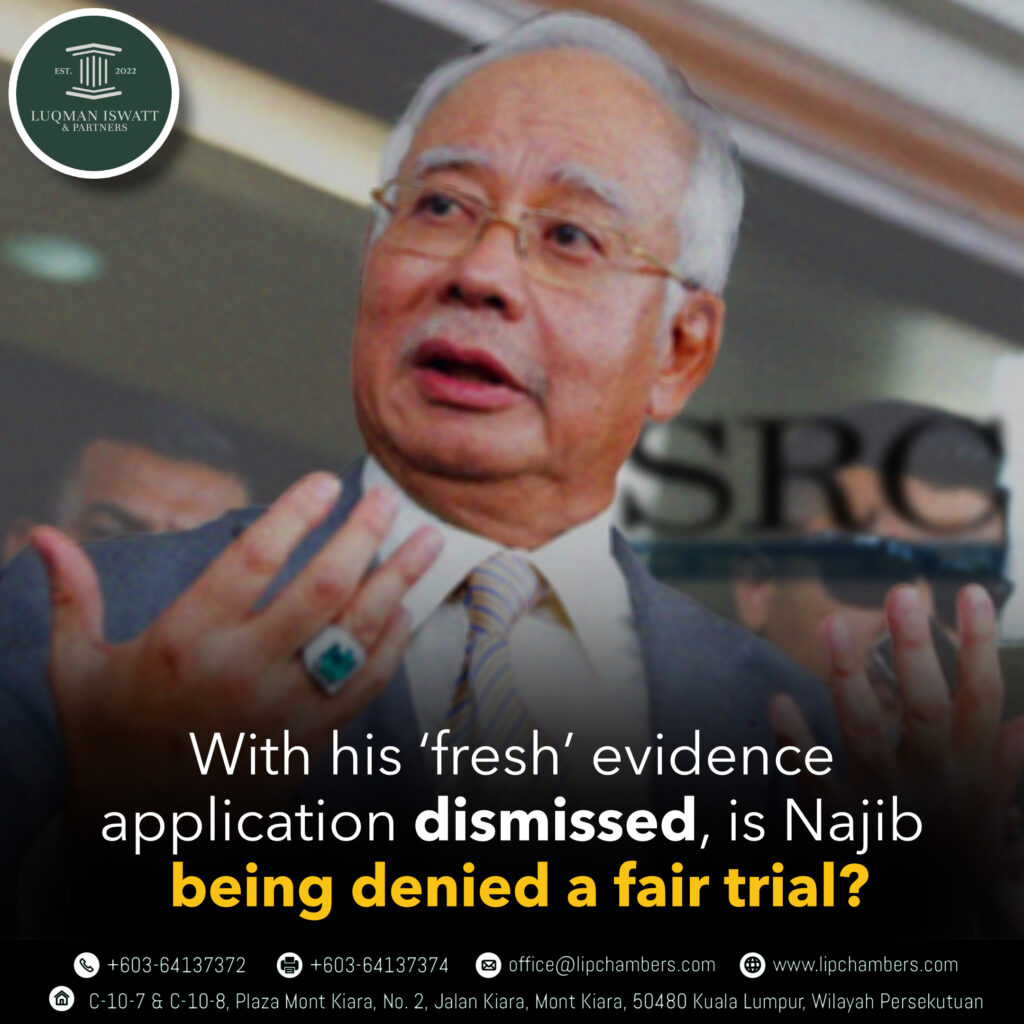
With his ‘fresh’ evidence application dismissed, is Najib being denied a fair trial?
Last Wednesday (16 March 2022), the esteemed 5-person Federal Court bench led by Chief Justice Tengku Maimun Tuan Mat unanimously dismissed Dato’ Sri Najib Razak’s application to introduce new evidence in his infamous SRC International corruption trial. Two-time is definitely not the charm for the former Prime Minister, as this latest dismissal affirmed the decision made by the Court of Appeal last December.
So, why was this alleged ‘fresh’ evidence dismissed by both courts? For a fair trial and for justice to prevail, shouldn’t all evidence be considered?
Well, let’s examine the relevant laws and court procedures to see whether ‘Bossku’ has a valid reason to be aggrieved or should his team feel embarrassed for applying in the first place.
Is fresh evidence permitted to be adduced during an appeal?
In short, yes! An appellate court has the discretion to allow any new evidence to be adduced. However, the appellant must first make an application by filing a motion to adduce fresh evidence.
In other words, by way of a notice of motion, the applicant must explain the nature of the fresh evidence and why it is in the interests of justice that it be allowed.
Well, the former Prime Minister’s defence has definitely done so and the Federal Court has in turn heard the said application. The next step is for the court to decide whether the fresh evidence passed the test for the admission of fresh evidence by applying the relevant laws and legal principles.
Principles of adducing fresh evidence
In Malaysia, the admission of fresh evidence is governed under Section 61 of the Courts of Judicature Act 1964 (Revised 1972). Furthermore, this principle of adducing new evidence is based on the ratio in R v Parks [1961] 3 All ER 633, which was later approved by the House of Lords in the case of R v Pendleton [2002] 1 WLR 72.
In R v Parks (supra), Lord Parker CJ, at page 634-635 held, among others as follows:
“It is left entirely to the discretion of the court, but the court in the course of years has decided the principles on which it will act in the exercise of that discretion. Those principles can be summarised in this way: First, the evidence that it is sought to call must be evidence which was not available at the trial. Secondly, and this goes without saying, it must be evidence relevant to the issues. Thirdly, it must be evidence which is credible evidence in the sense that it is well capable of belief; it is not for this court to decide whether it is to be believed or not, but it must be evidence which is capable of belief. Fourthly, the court will after considering that evidence go on to consider whether there might have been a reasonable doubt in the minds of the jury as to the guilt of the appellant if that evidence had been given together with the other evidence at the trial.”
The ratio in the aforesaid case has been applied and adopted in local cases, particularly in the recent Court of Appeal decision in relation to Dato Sri Najib Razak’s application. Basically, in order for fresh evidence to be admitted, the applicant must satisfy the following elements:
- The evidence that it sought to call must be evidence which was not available at the trial;
- The evidence must be relevant to the issues;
- The evidence is credible in the sense that it is well capable of belief; and
- The evidence would have created a reasonable doubt in the mind of the jury as to the guilt of the appellant if that evidence had been given together with the other evidence at the trial.
Furthermore, these conditions must be cumulative and not alternative, meaning that all conditions must be fulfilled or it will result in the application being dismissed.
Putting Najib’s fresh evidence application to the test
In order to gauge the merit of the former Prime Minister’s application, we must put this alleged new evidence through the test mentioned above. First and foremost, what actually is this alleged fresh evidence?
Based on what is known regarding the appeal, it is related to the recent allegations that former Bank Negara governor Zeti Aziz’s family received funds from 1MDB-linked fugitive Low Taek Jho.
With that in mind, was this alleged evidence not available to Najib during the SRC trial previously? Well, according to Chief Justice Tengku Maimun, no.
Despite the allegations only surfacing after the SRC trial’s verdict in High Court, Tengku Maimun revealed that the Pekan MP’s defence actually had witnesses related to the allegation, including Zeti herself available throughout the trial. In fact, Najib’s team was the one who declined to call them in.
More importantly, this new evidence won’t have any determining influence upon the decision of the case, given that it has nothing to do with SRC. Her Ladyship Tengku Maimun further asserted that the evidence sought to be adduced is irrelevant because it relates to another case, namely Najib’s 1MDB trial, and not to the SRC case at hand.
A similar stance was made during the dismissal of the application by the Court of Appeal, whereby the verdict stated that there were ‘no exceptional circumstances or conditions’ shown by Najib’s defence for the court to consider additional evidence.
Therefore, it was unceremoniously dismissed.
Even if it can be argued that this alleged new evidence was not available during the previous SRC trials, it is important to remember that all conditions of the test for the admission of fresh evidence must be fulfilled and not just one of them. Hence, it is within the power of the Federal Court to dismiss Najib’s application and based on the facts of the case, it is indeed the right decision.
Najib is not deprived of a fair trial
Circling back to the question posed at the beginning of this article, the assertions above definitely showed that there was no merit in Najib’s additional evidence application and the allegations that Najib is being denied a fair trial is definitely unfounded. As Her Ladyship Tengku Maimun put it, “The appellant was not deprived of the right to be heard or denied a fair trial,”.
Now, all eyes will be on the former Prime Minister’s final appeal of the SRC International trial that would be heard in the highest court, the Federal Court.


